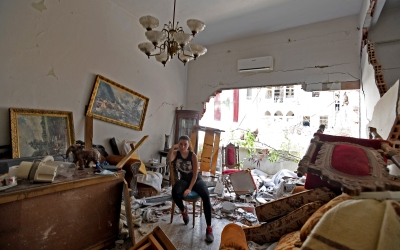Beirut explosion: Judge suspends blast probe amid political pressure
 |
The judge overseeing an investigation into the massive explosion that rocked Beirut in August has suspended the probe after two ministers he charged with negligence requested he be removed, according to judicial sources.
Judge Fadi Sawwan on 10 December issued charges against caretaker prime minister Hassan Diab and high-ranking former ministers Ali Hassan Khalil, Ghazi Zaiter and Youssef Fenianos over the 4 August blast.
The four were charged with "negligence and causing death to hundreds and injuries to thousands more" in one of the largest non-nuclear explosions in history.
Lebanon's top Cassation Court is now expected to rule on their request for Sawwan to be removed from his post, AFP reported.
"Until then, all investigation proceedings are suspended," a senior court judicial official told the news agency on condition of anonymity.
'This is a security coup'
Earlier this week, a source close to Judge Sawwan told Middle East Eye that the investigation into the huge blast has been targeted by a scathing "political campaign".
Lebanon's politicians have rallied around the argument that the indictment of a minister should be submitted to a vote in parliament.
The four indicted ministers were the first politicians to be charged since the beginning of the investigation, which opened on 14 August. Other officials, such as the country’s justice minister and predecessors, were interrogated, but as witnesses rather than as defendants.
Diab, who resigned in the wake of the explosion, already testified before Sawwan in September.
Karim Nammour, a lawyer and board member at rights group Legal Agenda, warned last week that the independence of the legal probe was at risk.
"The judiciary is being directly targeted," he told MEE at the time, adding that Lebanon has become far more militarised in recent months. "When you are discrediting the role of the judiciary … this is a security coup in every sense of the word."
Nammour noted that the judiciary has been "discredited publicly", especially as judges have begun to defy political orders. Last month, Mohammed Fahmi, the caretaker interior minister, claimed that "95 percent of judges are corrupt".
The explosion that rocked the capital this summer, killing around 200 people and wounding thousands, was traced back to almost 3,000 tonnes of explosive ammonium nitrate left unattended at the port for over half a decade.
The fact that little light has been shed on the circumstances that led to Lebanon's worst peacetime disaster nearly four months after the blast has caused outrage.
It is also fuelling mistrust among international donors whose support is much needed if Lebanon is to stand a chance of surviving its deepest-ever economic crisis.




No comments:
Post a Comment
Note: only a member of this blog may post a comment.